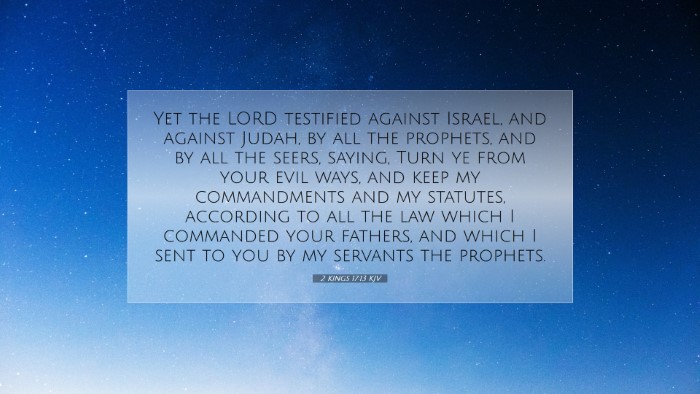Commentary on 2 Kings 17:13
Verse: "Yet the Lord testified against Israel, and against Judah, by all the prophets, and by all the seers, saying, Turn ye from your evil ways, and keep my commandments and my statutes, according to all the law which I commanded your fathers, and which I sent to you by my servants the prophets."
Introduction
The narrative of 2 Kings 17:13 reflects the divine initiative in reaching out to His people, Israel and Judah, through prophets and seers. The verse encapsulates a pivotal moment during the decline of the northern kingdom of Israel and serves as a critical warning that echoes through the ages.
Insights from Public Domain Commentaries
Matthew Henry's Commentary
Matthew Henry emphasizes the mercy of God in sending prophets to urge repentance. He notes that the phrase "testified against" shows God’s persistent call to His people. Even amid their transgressions, God's desire for their return remained evident. This shows not just a warning but an opportunity for restoration. Henry points out:
- God's Patience: The continual sending of prophets illustrates God's long-suffering nature and His relentless pursuit of a relationship with His people.
- Message of Repentance: The call to "turn" signifies a change in direction, aligning one's life back to divine commandments as an essential act of faith.
- Rejection of Prophetic Words: This verse underscores that while God speaks through His messengers, the people's apathy leads to their downfall.
Albert Barnes' Notes
Albert Barnes provides a detailed analysis of the historical context in which this proclamation was made. He points out that both kingdoms—Israel and Judah—faced judgment due to their disobedience. His commentary highlights several themes:
- The Role of Prophets: Barnes discusses the significance of prophets in ancient Israel, who acted as intermediaries between God and His people.
- Recapitulation of Covenant: The use of "my commandments and my statutes" refers back to the covenantal relationship established with their forefathers, demonstrating that God’s expectations remain unchanged.
- Impending Judgment: The warning delivered through the prophets contained a dual aspect of hope within the message of judgment—repentance could avert disaster.
Adam Clarke's Commentary
Adam Clarke's exposition delves into the theological implications of divine testimony and human free will. Clarke presents the following insights:
- Divine Love in Warning: He notes that God's willingness to send messengers speaks to His deep love and desire for repentance, contrasting the harsh realities of their practice with the grace offered.
- The Necessity of Obedience: Clarke articulates that true worship entails not only hearing divine commandments but also an active commitment to adhere to them.
- Historical Rejection: He underscores that the historical narrative serves as a warning for future generations, particularly in understanding the dire consequences of neglecting God’s voice.
Theological Reflections
The richness of 2 Kings 17:13 resonates strongly with contemporary imperatives for repentance and adherence to God's word. The verse invites us to reflect deeply on:
- God’s Continued Outreach: In every era, God communicates His will to His people, serving as a reminder that the call to righteousness is timeless.
- Repentance as a Response: Our true response to God’s warnings should mirror the biblical call to return to Him with contrite hearts.
- The Weight of Prophetic Voices: Recognizing the significance of those who preach and teach God's word today encourages active engagement in heeding scriptural truths.
Conclusion
2 Kings 17:13 is not merely a historical admonition but a profound testament to the nature of God’s interaction with humanity. Through the examination of various commentaries, we glean that God’s persistence and patience ultimately lead to an invitation to transformation. This verse encourages both the individual believer and the collective church to heed the call to repentance, maintaining fidelity to God's covenant as we journey forward in faith.


